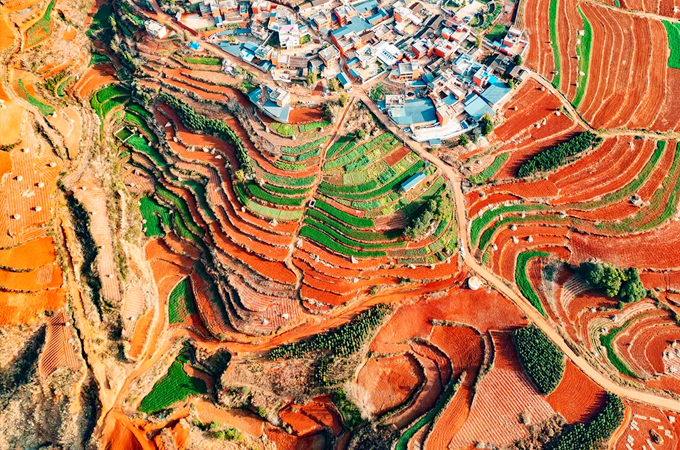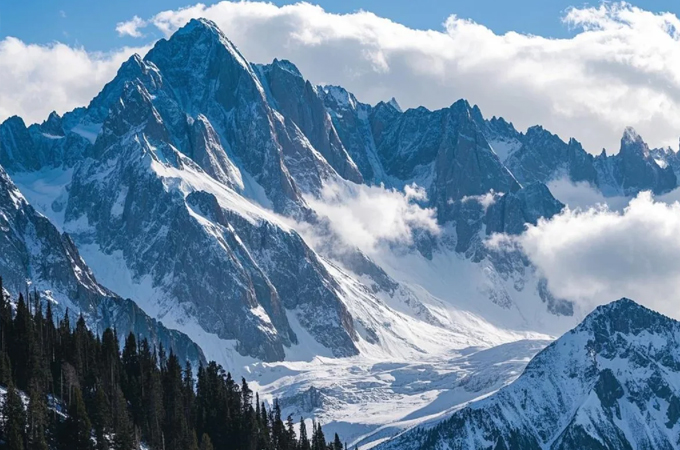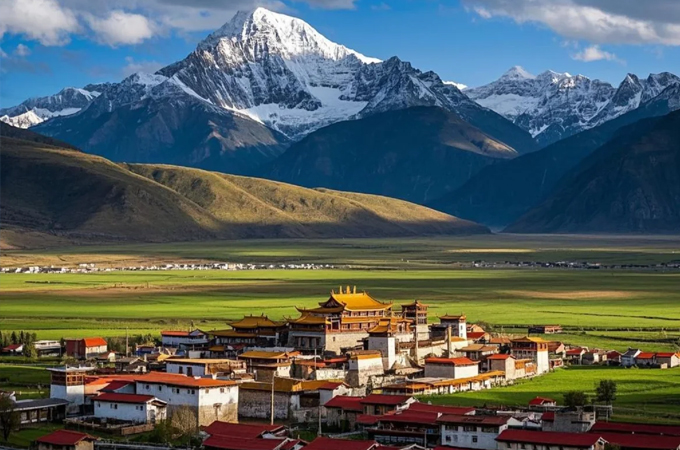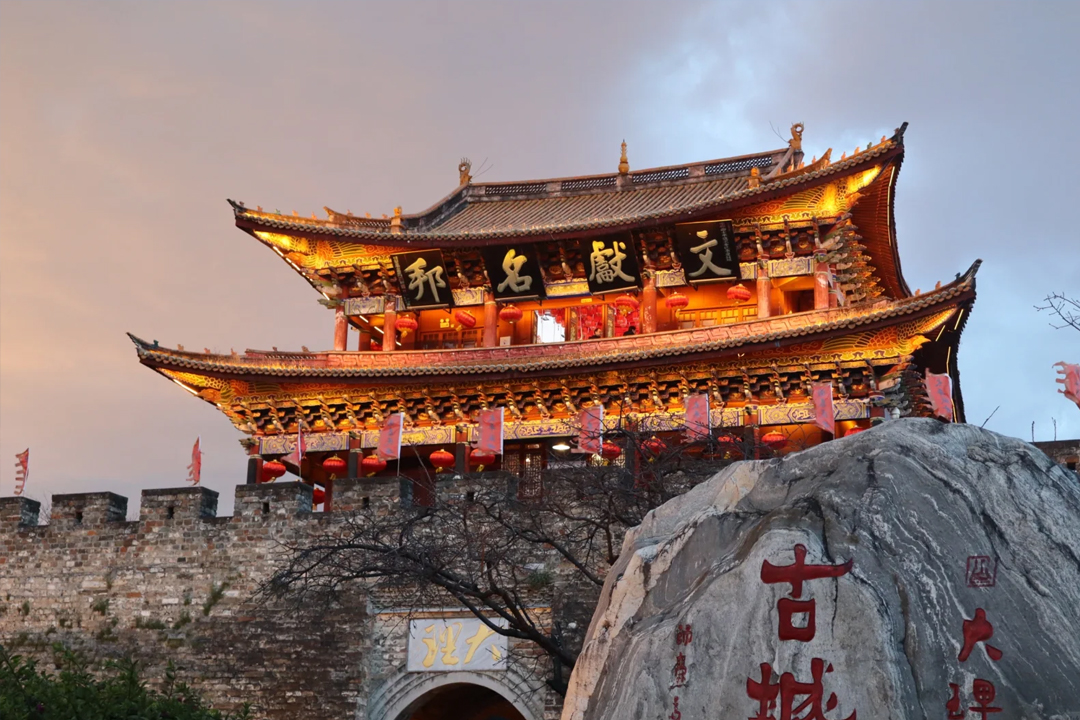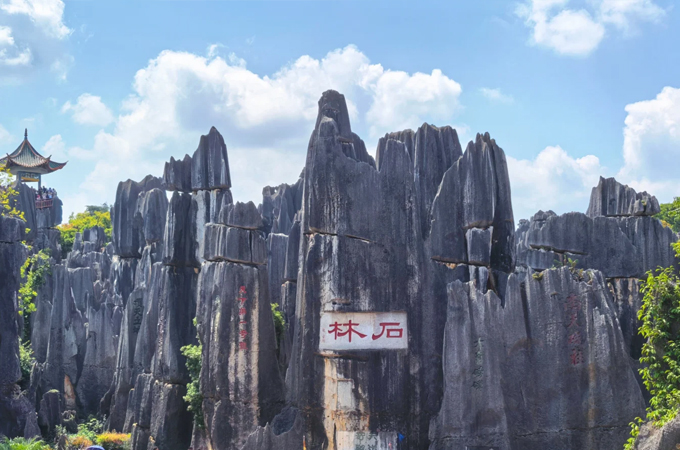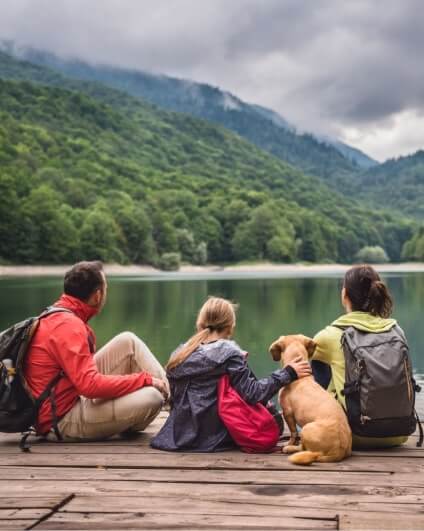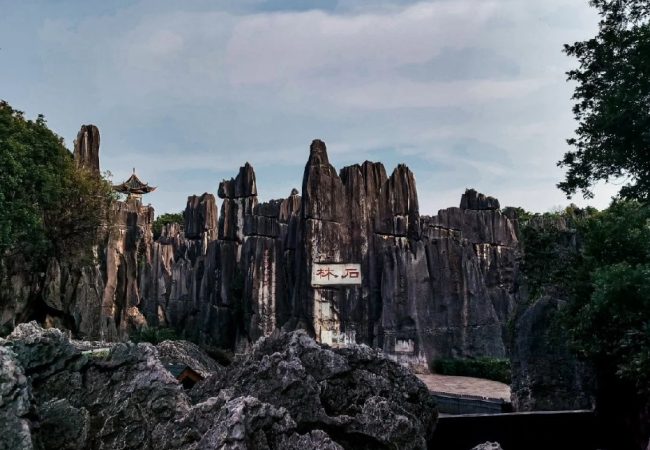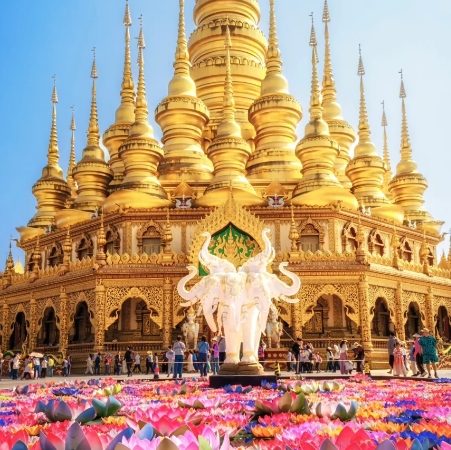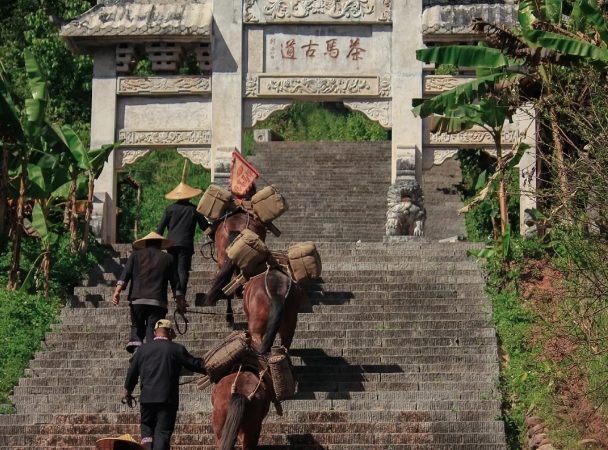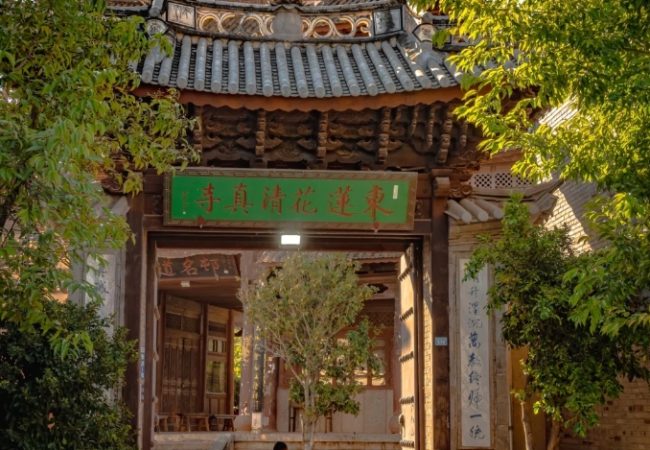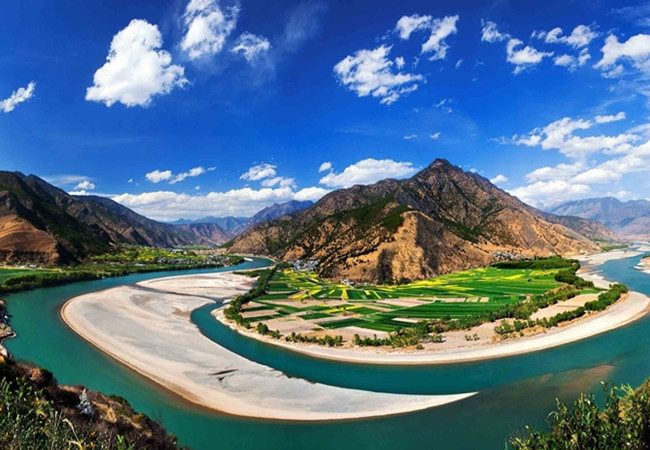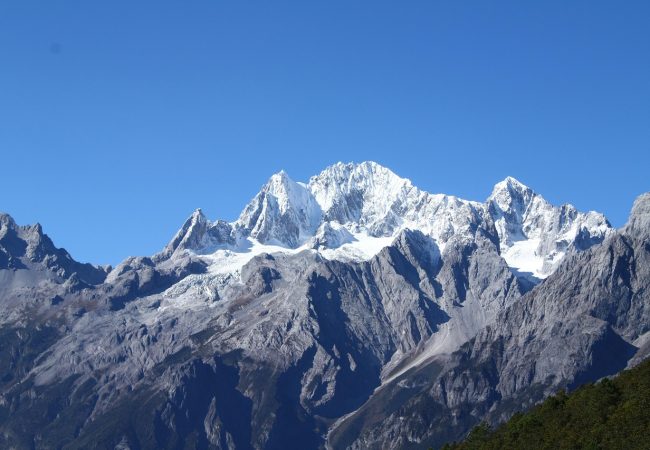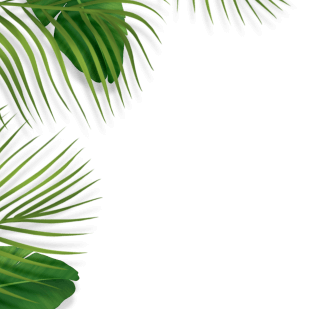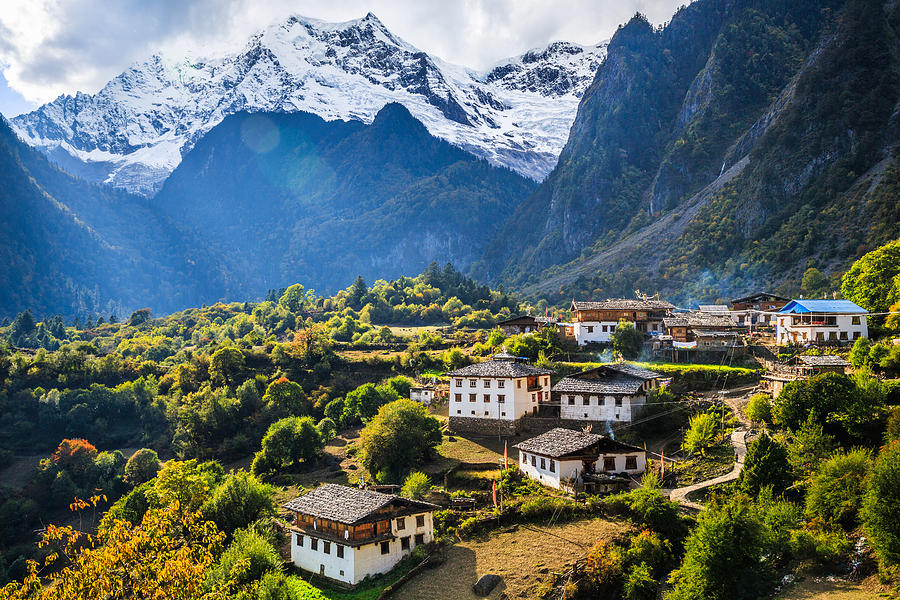
Yubeng Village (雨崩村) is located in Yunling Township (云岭乡), Deqen Tibetan Autonomous Prefecture (迪庆藏族自治州), Yunnan Province (云南省). It sits at the foot of the Niancimu Peak (念慈母峰) of Meili Snow Mountain (梅里雪山), with an elevation of about 3,100 meters. The village is surrounded by mountains on all sides and is divided into Upper Yubeng Village (上雨崩村) and Lower Yubeng Village (下雨崩村). It is only accessible through a single mountain trail.
Geography
Yubeng Village is situated at the foot of the Five Sons Peaks (五子峰) of Meili Snow Mountain, in a remote location. There are no direct roads leading to the village. Visitors need to start from Xidang Village (西当村) or Nongcun Village (尼农村), and hike or ride horses across the Nanzong Pass (南宗垭口) at an elevation of 3,700 meters. The journey covers a distance of about 18 kilometers.
Cultural Customs
Yubeng Village is a typical Tibetan village where residents practice Tibetan Buddhism and maintain traditional Tibetan lifestyles. The village celebrates traditional Tibetan festivals such as the Tibetan New Year (藏历新年) and Butter Flower Lantern Festival (酥油花灯节). It is also an important stop on the pilgrimage route around Meili Snow Mountain. Every autumn, Tibetan pilgrims visit the village to make their pilgrimage, stacking mani stones (玛尼堆) along the way as a form of prayer.
Weather
Yubeng Village has a high-altitude humid climate, significantly influenced by monsoons. The rainy season is from June to August. The spring and autumn seasons are mild and are the best times to visit. In winter, snowfall is possible, and some routes may be closed.
Best Time to Visit
- Spring (May to July): The landscape is lush and green, full of vitality. However, from June to July is the rainy season, and the mountain paths can be slippery.
- Autumn (September to November): In mid-September, the wolf poison flowers (狼毒花) turn red, and from October to November, the mountains are covered in golden leaves. This is the best season to view Meili Snow Mountain.
- Winter (December to February): There are snowscapes, but some routes may be closed due to snow.
Natural Attractions

- Snow Mountains and Glaciers: Yubeng Village is surrounded by Meili Snow Mountain, with the majestic Kawagebo Peak (卡瓦格博峰, 6,740 meters) clearly visible in the distance.
- Shenpu Waterfall (神瀑): Located in the southern part of Yubeng Village, it is a sacred site for Tibetan Buddhism. Tibetans believe that bathing under the waterfall can purify the soul.
- Ice Lake (冰湖): At an elevation of 3,800 meters, it is one of the highest accessible points in Yubeng Village. It is about a one-hour walk from the Sino-Japanese Joint Climbing Expedition Base Camp.
- Five Trees Growing from One Root (五树同根): A unique natural phenomenon where multiple parasitic plants grow on a single tree trunk.
Cultural Highlights

Yubeng Village is a traditional Tibetan village where residents have lived for generations, relying on farming and animal husbandry. The village retains traditional Tibetan wooden houses, stone walls, and wandering livestock. It also preserves many traditional Tibetan festivals, such as the Tibetan New Year.
Traditional Festivals:
- Tibetan New Year: The most important festival for Tibetans, celebrated on the first day of the Tibetan lunar calendar. During this time, villagers dress in traditional attire and engage in various activities such as blessings, sacrifices, setting off fireworks, and burning juniper branches (煨桑). Families also prepare a sumptuous Tibetan New Year’s Eve dinner and invite relatives and friends to share.
- Butter Flower Lantern Festival: Held on the fifteenth day of the first Tibetan lunar month. Villagers make exquisite butter flowers and light butter lamps in temples or at home, praying for peace and good fortune in the coming year.
- Pilgrimage Festival (转山节): An important religious festival for Tibetans, usually held in autumn. Villagers trek along the pilgrimage route around Mount Kawagebo, praying for blessings from the deities. Along the way, they stack mani stones at streams and riverbanks as a sign of respect.
- Shoton Festival (雪顿节): A traditional Tibetan festival, usually held in the seventh Tibetan lunar month. During this time, villagers engage in activities such as dancing the Guozhuang (锅庄舞) and having picnics, celebrating the harvest through song and dance.
These festivals are not only important expressions of Tibetan culture but also excellent opportunities for visitors to gain a deeper understanding of Yubeng Village’s traditional customs.
Activities During the Pilgrimage Festival
During the Pilgrimage Festival in Yubeng Village, villagers engage in a series of activities with religious and cultural significance, including:
Pilgrimage Trekking
Villagers trek along the pilgrimage route around Meili Snow Mountain, praying for peace and a bountiful harvest. Along the way, they stack mani stones at streams and riverbanks as a sign of respect to the deities.
Sacrificial Rituals
During the festival, villagers visit temples to burn incense and pray, burn paper money, and seek blessings from the deities. Lamas blow long horns and suona (a type of horn), and people perform kowtows around the altar or the sacred mountain.
Blessing Ceremonies
Villagers build mani stone piles by the Yubeng River downstream of the Shenpu Waterfall, seeking divine protection. At the waterfall, pilgrims receive a purification bath from the sacred water, completing their pilgrimage.
Picnics and Dancing
After the pilgrimage, villagers set up tents on the grasslands, have picnics, boil butter tea, and enjoy traditional Tibetan foods like tsampa (糌粑). They gather in circles to dance the Guozhuang and sing songs, enjoying the festive atmosphere.
Hanging Prayer Flags and Wind Horse Flags
Villagers carry prayer flags and wind horse flags, hanging or tying them to trees along the pilgrimage route, praying for good weather and the well-being of livestock.
These activities reflect the Tibetan people’s devout faith in the sacred mountains and showcase the rich cultural traditions of the region.
Transportation Guide
External Transportation
To reach Yubeng Village, visitors usually first arrive in Shangri-La (香格里拉) or Lijiang (丽江), and then transfer to Deqen County (德钦县). From Deqen County, you can take a bus to Xidang Village.
Internal Transportation
From Xidang Village to Yubeng Village, you can choose to hike or ride a horse. The journey involves crossing the Nanzong Pass at an elevation of 3,800 meters. The total distance is about 9 kilometers. The cost of riding a horse is approximately 185 RMB from the village to the pass, and 235 RMB from the pass to Upper Yubeng Village.
Accommodation
Yubeng Village offers a variety of accommodation options, including hotels, guesthouses, and homestays. There are standard rooms with better facilities as well as more economical dormitories. Some accommodations integrate Tibetan cultural elements, allowing visitors to experience the rich ethnic atmosphere.
Food and Shopping
Food
The village offers traditional Tibetan foods such as butter tea, highland barley wine, tsampa, yak meat, as well as local specialties like Diqing Tibetan pork and Deqen matsutake mushrooms.
Shopping
You can purchase Tibetan handicrafts such as thangkas (唐卡), Tibetan carpets (藏毯), and mani stones, as well as local specialties like Diqing highland wine, cordyceps (虫草), and snow lotus flowers (雪莲花).
Travel Tips
When visiting Yubeng Village (雨崩村), it is important to pay attention to physical preparation, equipment, and environmental protection. The following is a detailed introduction:
Physical Preparation and Acclimatization
- Early Acclimatization: Yubeng Village is at a high altitude, and altitude sickness may occur. It is recommended to start taking anti-altitude sickness medication one to two weeks in advance. After arriving in Deqen Prefecture (迪庆州), stay for 1-2 days to acclimatize to the high-altitude environment and avoid strenuous exercise.
- Monitor Your Health: During the trip, if you experience severe symptoms of altitude sickness such as headache, dizziness, difficulty breathing, or accelerated heartbeat, stop your journey immediately and seek medical attention or oxygen therapy. If you have chronic diseases such as heart disease, high blood pressure, or respiratory system disorders, consult a doctor before departure to assess whether your health condition is suitable for the trip.
Equipment and Supplies
- Clothing: The weather in Yubeng Village is highly variable with a large diurnal temperature range. Even in summer, you should prepare warm clothing such as down jackets, fleece tops, and waterproof breathable jackets and pants. Also, bring a raincoat instead of an umbrella, as umbrellas are inconvenient during hiking and may attract lightning in high-altitude thunderstorms.
- Footwear: Choose waterproof, slip-resistant, and comfortable hiking or mountaineering shoes to deal with muddy and slippery mountain paths.
- Other Supplies: Bring enough food and drinking water. Although there are supply points along the way, it is still necessary to carry some high-calorie foods such as chocolate and beef jerky. Also, bring sunglasses, sunscreen, hats, and lip balm to protect against the strong ultraviolet rays at high altitudes. A headlamp or flashlight is also essential in case you hike after dark.
Itinerary and Safety
- Route Planning: There are many hiking routes in Yubeng Village, some of which are challenging and potentially dangerous. If you are visiting for the first time, it is recommended to follow an experienced guide or join a reputable travel group. Do not venture into undeveloped areas alone. Even if you are familiar with the routes, plan your daily itinerary in advance and arrange your time and rest stops reasonably.
- Transportation Safety: If you choose to ride a horse, select a regular horse team and follow the horseman’s instructions. Avoid making dangerous moves while riding.
- Respect Local Customs: Yubeng Village is a Tibetan settlement, and it is important to respect local religious beliefs and customs. For example, remove your shoes when entering a Tibetan home, do not touch religious items such as Buddha statues or prayer flags, and avoid smoking or drinking in temples.
Environmental Protection
- Garbage Disposal: The ecological environment of Yubeng Village is fragile. Keep the environment clean and do not litter. Try to pack your garbage into bags and take it to areas with waste disposal facilities for centralized treatment.
- Vegetation Protection: Do not damage local vegetation, avoid picking flowers or trampling on meadows, and do not enter the core areas of nature reserves.
Other Matters
- Communication and Navigation: Some areas in Yubeng Village have weak mobile phone signals. Download offline maps in advance and ensure your phone is fully charged. If possible, bring emergency communication devices such as satellite phones.
- Emergency Rescue: Familiarize yourself with the local emergency rescue phone numbers and the locations of rescue institutions. Seek help immediately in case of an emergency.
We hope this introduction helps you understand more about Yubeng Village. If you plan to visit, please check our travel routes for more information.

